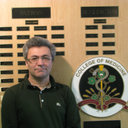The first application of a new polysaccharide from Acanthophyllum bracteatum for the health improvement of Atlantic salmon exposed to mercury chloride.
Keywords
Abstract
Polysaccharides are biopolymers that play key roles as therapeutic agents. The current study examined the efficiency of a polysaccharide newly derived from a plant resource for detection of sub-acute mercury (Hg) exposure on blood characteristics of Atlantic salmon. The polysaccharide was extracted from the roots of Acanthophyllum bracteatum, and the Atlantic salmon were divided into three groups and placed in fiberglass tanks: one with no Hg as a control, one filled with 60 µg l(-1) of Hg solution, and one with 60 µg l(-1) Hg solution plus 1% weight/weight (w/w) of polysaccharide, which had been added 24 hours before the addition of Hg solution. Serum hematological and biochemical parameters were analysed. Results of the study showed that the blood factors were significantly adjusted in the group that had been exposed to the polysaccharide and Hg compared to the group that had been exposed only to Hg. The polysaccharide had an adjustment effect on lymphocytes, granulocytes, red blood cells (RBCs), Hemoglobin (Hb), mean corpuscular volume (MCV), mean corpuscular hemoglobin (MCH), alanine aminotransferase (ALT), aspartate aminotransferase (AST), protein, chlorine (Cl), sodium (Na), and glucose. It did not have a significant effect on hematocrit (Ht), mean corpuscular hemoglobin concentration (MCHC), potassium (K), and monocytes. Finally, the results confirmed that the new polysaccharide has useful effects on the host, possibly acting as a probiotic by selectively motivating the activity of some useful bacteria, which can improve the host health. This is the first report on application of this polysaccharide for the health improvement of Atlantic salmon exposed to mercury chloride.


